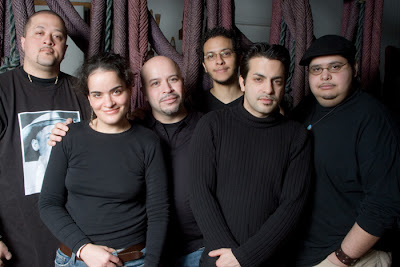 L-R -- La Familia Acentos: Sam "Fish" Vargas, Maria Nieves, Oscar Bermeo, Ed Garcia, Raymond Daniel Medina, and Rich Villar. Photo courtesy of Peter Dressel
L-R -- La Familia Acentos: Sam "Fish" Vargas, Maria Nieves, Oscar Bermeo, Ed Garcia, Raymond Daniel Medina, and Rich Villar. Photo courtesy of Peter Dressel
Today's column is about the unstoppable, about what community, strong words and strong voices can do. We'll be talking to one of the louderARTS/Acentos collective, Rich Villar, but first let's take a look at the group and what they're committed to do.
The louderARTS Project is a not-for-profit arts corporation committed to developing constructive and challenging spaces for artists to create, critique, present, and teach poetry.
The louderARTS Project seeks to:
• create a literary and artistic environment for both its artists and audience by expanding perspective, voice and critical vocabulary.
• sponsor literary arts programming in underserved communities.
• encourage experimentation and growth by its artists by creating opportunities to craft and present collaborative, cross-genre work incorporating mixed media, music, dance, and theatrical elements.
• foster a deeper understanding, within its artists and audience, of the oral and literary traditions which underlie today's poetry.
• work in partnership with other organizations to maximize the strengths and expertise of each.
The louderARTS Project is dedicated to uniting the various worlds of poetry (writing and performing, traditionalist structure and slam form, study and action, personal and political, solitary and collaborative, genre-specific and genre-bending), in a way that is both altruistic and personally and artistically evolutionary.
ACENTOS BRONX POETRY SHOWCASE
"Acentos is one of the best audiences, one of the best venues, I've ever seen. The organizers do a great job, not only in terms of spreading the word, but also in terms of creating anticipation. I feel like I'm part of a community, part of a movement. Aquí estamos y no nos vamos." Martín Espada
The debate may rage forever as to who or what constitutes Latino poetry. Here, there is no such identity crisis. We are already here, writing the histories of our neighborhoods, following the traditions of our ancestors, as well as the poetic traditions that came before us. To paraphrase Baldwin, the poet's task as historian is to keep the story new, even when the telling is costly. This is the aesthetic we foster at Acentos. It is always about the word, the work, and it all begins here.
Poetry, we believe, provides the most honest witness to our world, and it is among the oldest art forms on earth. Each poet is a breathing history, and we invite each poet to ring out in his or her own distinctive voice. Acentos celebrates a diversity of voices, communidad both on the open mic and within the universe of Latino and Latina poets on our feature stage.
Acentos Bronx Poetry Showcase is committed to maintaining a safe open space for the expression and enjoyment of poetry, no matter what the language, without translation or apology. Each reading is a celebration of our work as colleagues, friends, and family.
Proudly based in the Mott Haven section of the Bronx, New York, at the Bruckner Bar and Grill (Corner of Third Avenue and Bruckner Boulevard), Acentos showcases nationally recognized Latino and Latina poets alongside emerging voices every second and fourth Tuesday of the month in a setting designed to foster an increased sense of community.
Acentos Bronx Poetry Showcase
2nd and 4th Tuesdays @ 7:00 pm
The Bruckner Bar & Grill
1 Bruckner Boulevard (Corner of Third Avenue)
Bronx, NY
6 Train to 138th Street
FREE ($5 Suggested Donation)
For more information, write to:
acentos at louderarts dot com
For a full listing of scheduled features for Spring and Summer 2007, visit us on MySpace: myspace.com/acentosbronxpoetryshowcase
xxxxxxxxxxxxxxxxxxxxxxxxxxxxx
The following is my interview with Rich Villar, one of the louderARTS/Acentos collective, a poet and writer, and someone whose writing leaves an indelible mark in your mind. Before you read Rich on where he came from and what needs to be done, let me say a few words about his poetry.
It is frank, sinewy writing, the kind that lays bare those naked truths of the heart, of experience, unafraid to reveal where the scar tissue is. It's about loss and familia, but also stubborn in the ways it frames the set pieces of madre y padre without sentimentality and outside the stereotypes. But don't think that the depth of feeling isn't there....it rises up from the page, raw and tender and that same time. Read some of his poetry and feel your heart break open.
xxxxxxxxxxxxxxxxxxxxxxxxxxxxx
Describe your odyssey in becoming a writer. How does Puerto Rican identity and a New York sensibility influence your work? What would you say are your major influences, both personally and in a literary sense? I attended fundamentalist Christian schools during my entire childhood in Northern New Jersey. Given that backdrop, my teachers encouraged me to read a lot of Bob Jones and Charles Dickens and write more poems about Jesus. But in college, a no-goodnik left-wing Literature professor taught me how to close-read poems and introduced me to the Beat poets and James Baldwin. I spent another few years writing occasional Allen Ginsburg ripoffs, and attending some poetry slams.
Two things happened in 2003: I came across the
louderARTS Project, and I heard the work of Martín Espada. Martín was the writer who finally gave me permission to write about the things I cared about, in the language(s) I grew up with. The
louderARTS Project and the
Acentos reading series gave me the forum, the circle of friends, and the tough love I needed to stretch in my work. Coincidentally, Jesus started showing up in my work too, but he sounded far more conflicted than he did in my high school days.
I name the world through the lenses I see it with: my identities (Puerto Rican, Cuban, American, Latino), my family, my histories, my politics, my home. Any honest work I do must reflect these things one way or another, even when the poem is not explicitly about them. I am not a New York writer per se, but my experiences growing up and learning to write were not that different from the Nuyoricans in the Bronx, El Barrio, or on the Lower East Side. Reading Pedro Pietri really put that into focus for me. In the suburbs of Paterson, NJ, we didn't always sweat the rent or the heat, but we lived our own "Puerto Rican Obituary" under the thumb of the mortgage company and the credit card bills. My family is populated by viejitas like Pietri's "Tata." These are the real terms, people, places, and things which I find I MUST write for and about, in my own languages, in order to stay true in my writing and career.
I would say that my most important mentor thus far has been Martín Espada. He is far and away the most clear and steadfast example on why we must continue writing, how the successful writer must always be guided by principle, by comunidad. His friendship and leadership have proven invaluable to me and to his many brilliant students. The literary world is littered with too many established writers who make it a habit to "piss on the shoes of their disciples," (to quote the poet), and Martín is a much-needed oasis from that nonsense.
My creative influences are varied: Willie Perdomo taught me to be fearless in my use of language. Miles Davis and James Baldwin taught me that I must always keep it new. La Lupe and Celia Cruz keep my art unapologetic. Espada, Neruda and Mistral remind me that my writing can be historic. Chuck Close and Compay Segundo taught me persistence. The poets of
Acentos and
louderARTS are my backbone. My parents have supported me 1000% (even when they didn't know why). And I must say, there is no greater reminder of work ethic than when you are the daily recipient of love, spirit, and support from another poet: in my case, my amazing partner, Ms. Tara Betts.
How would you describe the significance of spoken word and slam poetry, compared to more 'traditional' forms?I came from it. I think it's a great starting place for young poets. (Emphasis on STARTING.) I hate what it's become. But let me first speak to the tradition question.
Another poet, John Rodriguez, brought this point up the other night at an Acentos reading. Those of us Latino/a poets who come from spoken word and slam come from the tradition of hearing poems, more than we do from reading text. This is not to say we are not well read, or that we can't craft a decent poem on a piece of paper. For us, the poem is a communal experience, a shout, a humanizing music that needs to be heard out loud. In New York, this is nothing new. The "slam and spoken word tradition," so to speak, is significant in that it's really a Puertorriqueño tradition, an African-American tradition, the Nuyoricans, the Black Arts movement, and the tradition of much of Latin America. Spoken word and slam thus hearken back to poetry's root orality, a root unbroken since the Sumerians, yet one which we've forgotten somewhere along the line.
Many slam poets have gone on to careers in academia, bohemia, and back. Many do cutting-edge work with music, or work in the genres of sound poetry. And a few have even made viable careers out of being spoken word artists. It's fair to say that spoken word and slam serve well as breeding grounds for talent that wouldn't have come to poetry any other way but through the ear.
Having said that, I really hate what spoken word has become. The term is used with increasing abandon to sell out poetry to the highest bidder. It has become a world of back-slapping sycophants jockeying for what little money is out there on the college circuit. Of particular concern to me is the phenomenon of the spoken word pimp: the unscrupulous agent or manager who will gather a troupe of spoken word mavens and sell them as a package to colleges, often pocketing a big chunk of the fees. The talent, more often than not, is none the wiser. Maddeningly, some of them are kids, fresh from the world of teen slams.
Far too many of these young and emerging writers swallow the spoken word line wholesale, choosing not to push their visual art or publish their written art, relying on the antiquated standbys of poetry "for page" and poetry "for stage." Far too many choose not to read other poets, claiming to defend some ridiculous notion of purity in their art. And far too many entities on the college circuit or in the media lazily accept these definitions, paying thousands of dollars to perpetuate bad theater passed off as "performance poetry" or "spoken word." And don't get me started on how some critics tend to view it all as an offshoot of hip-hop, deriding otherwise promising young poets of color as mere "spoken word artists," rendering their work mute. Spoken word, once promising, is now a running joke, a cartoon show that the characters don't even know they're on.
Here is the end result. By selling themselves short as "spoken word artists," many otherwise emerging poets sacrifice any chance they have to improve in their work and move into something that pushes the forms. And for what? At the Grammys this year, there was a tie for Best Spoken Word Album between Ossie Davis and Ruby Dee, and Jimmy Carter. Obviously, none of these people are "spoken word artists ." Not even the recording industry is buying this nonsense. At the end of his or her shelf life as performers, the average spoken word poet is left with no real writing skill or experience, no real performance skill or experience, and no resume except for slam wins and tour stops. I submit that this American Capitalistic model of touring minstrelsy is no way to promote poetry to our youth, and to whatever extent that we as educators have the power to stop it, we absolutely should.
You're involved with louderARTS Project and Acentos in New York. Tell us about these, their goals, their audiences. What would you say are these projects' contribution to the local and national poetry scene?The
louderARTS Project started life as a weekly reading, open mic, and slam series called "a little bit louder," founded by three poets from the 1998 Nuyorican Poets' Cafe slam team: Lynne Procope, Roger Bonair-Agard, and Guy LeCharles Gonzalez. Their mission was to read, workshop, and perform their work with an emphasis on excellence; to improve the work and present it well. These core missions were expanded upon through public workshops, themed readings, and other public performances. They have managed to create a multicultural, multi-genre community of artists, writers, and educators from around the country, and many of them have come to view the reading series at Bar 13 in Union Square as the place to experience poetry as a transformative experience. The series will celebrate its tenth anniversary in April of 2008.
Building from the
louderARTS model and from anecdotes of the old 6th Street Nuyorican Cafe, poets Oscar Bermeo and Sam "Fish" Vargas co-founded the
Acentos Bronx Poetry Showcase in March of 2003 (I came on board in June of that year). There were precious few Latino poets active in the downtown poet scenes, so the intent with
Acentos was to bring Latinos and Latinas into a new venue, in the South Bronx, where one could share work without the need to translate every nuance present in Spanish, English, and Spanglish. Four years later, we've built the series into a staple of the Bronx arts scene, a space where poets and audience regardless of nationality can come in, feel at home, and share new work in an open and honest environment. We've featured Latino/a poets of every stripe, from all parts of the country, and four of our core members (myself, Oscar, Fish, and Jessica Torres) participated in readings and workshops all around the region spreading the gospel of Latino poetry.
Fish and I continue to run the series along with a dedicated cadre of emerging poets who have claimed the venue as their home. We are working this fifth year to expand
Acentos' mission into a Foundation for Latino/a poetry nationwide, modeled on Cave Canem. We hope to have a yearly Latino writers' retreat up and running by summer of '08, as well as writing programs for Latino/a youth in the Bronx. Point blank, poetry by Latinos has gone largely ignored by the literary establishment. We want to do our part to change that, and the best way we know how is to create the spaces necessary for writers to stretch, develop, and distribute their work.
What's it been like working collectively to maintain these projects?I would not be able to run
Acentos by myself, especially with these new growth ideas, were it not for the support of the following poets: Oscar Bermeo, Fish Vargas, Maria Nieves, Jessica Torres, Eliel Lucero, Ray Medina, Aracelis Girmay, John Murillo, John Rodriguez, Urayoan Noel, and Raina Leon.
Likewise, the
louderARTS Project would be nowhere without its resident louderARTISTS: Lynne Procope, Roger Bonair-Agard, Marty McConnell, Rachel McKibbens, Ray Medina, Mara Jebsen, Emily Kagan, Elana Bell, Fish Vargas, Abena Koomson, and Matt Siegel.
Not to mention the people that come in and out of our spaces on a daily basis, the audiences who actually watch this stuff instead of going home to watch Dancing with the Stars.
My work with
Acentos and
louderARTS is unlike any job I've ever had, and unlike any free time I've ever spent. This is work with purpose, with mission, and these artists have been my surrogate family. They have driven me to continue producing new work, to live the life of a poet and not that of an automaton. We listen to our guests, we read new work, we exchange ideas. While as colleagues we have our rough patches sometimes, I highly recommend the collaborative approach, especially when there are so many things that need to be done organizationally. You choose your mission, and you execute it with the right people. Punto. Plus, being in a circle of working artists is absolutely vital to guard against the "Organizer's Syndrome," in which you end up doing everything but write. I can't be uncreative when I'm surrounded by creative people.
How would you describe your connection to young writers as it relates to your creative life?I am only 29 years old, and I haven't published a book yet, so I hope I'm still perceived as a young writer myself. Having said that, writing is ultimately an attempt to live forever. You write with the hope that what you say has meaning, that it will be archived, and that the writers who come after you learn from your mistakes, imitate your triumphs, and build upon both. So I'm connected to young writers in the abstract, as I should be. More directly, some of my best moments as a poet have come watching my students in workshop take some seed of direction and run with a new idea, along with the understanding that each one of them has a unique story that only he or she can tell. The most satisfying connection with a young writer is that mutual "oh, shit!" moment that comes with a brilliant line—one that the young writer came up with on his or her own. It's a small victory, but still very gratifying.
In regards to your own poetry, what would you describe as your major themes? I write a lot about my family, because they've seen it all. Through their eyes I can deconstruct the politics of place, gender, and religion; the lies behind machismo; the tragedies of alcoholism. A lot of my work meanders between the city and the suburbs, as I have tended to do in real life. Music always makes its way into my work, and lately I've been experimenting with form to volley it back into the air. Technique-wise, I am interested in matters of language, translation, and wordplay, because there are some emotional landscapes I can only navigate in the chopped-up half-languages of Spanglish.
What are your core strengths as a writer.... where would you like to see yourself grow? I am good at litany. I can make most people laugh in person and in my writing. I have learned (am still learning) how to render poetry from my everyday speech. My sardonic wit is pretty sharp. I need more formal training, more art-historical perspective, more of that book-learnin'. I've done a great of deal of work outside the classroom, but starting in September, I will be studying with Rigoberto Gonzalez and others at Rutgers-Newark's new MFA program.
Where do you see yourself in ten years, personally and creatively? Writing, publishing, collaborating. Maybe writing more fiction. Hopefully with an active role in a vibrant community of Latino and Latina poets. Teaching somewhere, hopefully with my beautiful partner at my side. I'd like to own a house, but New York is crazy expensive, so we may have to invest in our own log cabin somewhere in Appalachia. Of course, if that happens, Betts and I will have to call Frank X. Walker and crew and hold Affrilachian poetry workshops on the front porch.
What's something not in the official bio? If they ever made a movie out of the cartoon show Thundercats, I would literally drop everything in sight to be at a midnight screening at the Whitestone Cinemas in the Bronx. I am a thorough nerdlet for 80's cartoon nostalgia. I'm already geeked for Transformers.
POEMS BY RICH VILLARMy Mother Responds to the Question, "So What Were You Thinking the Day After I Was Born?"They gave me a yellow baby, with yellow eyes,
a needle because the hospital has rules, right.
No need to poison any other babies with my blood.
Bullshit, I thought, who the hell wants to do this again?
Three is plenty. I wanted a Ricky,
just because I wanted the name to jump,
jump down the crib and run around the house,
laughing, imagining, naked.
That's not poetry, either. I mean really naked.
You wouldn't wear your diaper. Ever.
Oh.
You mean the first day? Sorry. They let me stay quite a while,
not like now, they barely let you heal
these days. I realized you were not blind
when I held your father's Marlboros over your head.
You followed the small box, transfixed by red.
I tried other colors too, but red was always your favorite,
you didn't get that from me, or your father,
everything for me is green, was green: the kitchen,
the car, my clothes, your clothes. You always hated clothes.
I wonder why.
Yes, the first day. Hell, what do I know,
it was the first day, I was exhausted, your father was at work,
there were no cell phones in those days,
the neighbor took me to the hospital,
it was 8:30, on the dot,
when you were born. I wanted a Ricky,
I already had a Dooley and a Chrissy
and your father wanted one more chance, so he brought me
roses on Valentine's Day (he never gives me flowers)
and nine months later, here he comes, tromping into the room
with his best friend, smiling.
He used to put you in his shirt pocket, he said.
But yes. The first day was all injections and charts and nods
and your brother wasn't an alcoholic yet and your sister still
listened to me and your father and I were almost married
and every time I held the red box above your head,
you would peel back your gums and wail beautifully,
and I spent the first of three days healing.
Six Attempts to Get My Father To Speak About the Day After My BirthI.
mira. mira.
aqui tengo tu poema.
oiga:
Este mundo es un relajo.
En forma de un gallinero.
Los que subieron primero.
Cagaran en los de abajo.
Pero si viene un guanajo.
No ligerito de peso.
Pue'ser que se quiebre el gajo.
Y los de arriba y los de abajo.
Se vayan to' pa'l carajo.
ah, ¿no te gu'ta?
pue', oye e'to.
Yo se que tú eres poeta.
y que del aire lo compone'.
Pon'te un farol en culo.
Y alúmbrate los cojones.
II.
en verdad. no recuerdo.
pipo, necesito un favor.
bú'came las carreras seis a doce de santa anita.
notalo en un papelito y trai'lo pa'rriba.
III.
¿que? pue' na'. me fui a trabajar.
IV.
i go to werk at five. i come back at two.
i no remembeh who call me, i think i'was ju seester.
my fren' come wi' me.
he giveh cigar to e' ri' body. y bueno, i donno. i go home and wait for ju mother.
V.
day afte'? i go home, i go to werk.
i ha' to makeh money. ju know.
i remembeh joo mother tell me ju okay, so i no worry too much.
i no believe i have anothe' baby. i no believe how moch ju look like joo brothe' gusti.
i no believe ju so leetle guy, and now ju so big guy.
i put ju in my pocket.
VI.
ju writeh poem how? ¿en mi voz?
pue'. oiga esto que te voy a decir ahora.
los poetas mueren joven, okay? bú'cate algo esteady, que nunca sabes que va pasar.
ay que buscar poetas cubanos, que son de los mejores.
¿sabes que martí fue poeta?
ay, mi'jo. ay un millón de poemas que tengo aqui, memoriza'o.
así se aprenda los poemas, ¿sabes?
ay mi'jo. un millón.
Burial Instructions
If they left it up to me, maybe I'd freeze him,
pickle him in a six-foot jar, label it with instructions,
a warning for my kids: This is
what happens when you live your life timidly.
You die of sleep apnea, untreated, your wife
mourns you from the road and your kids—
well. If you have any, they will spend hours
staring at television, their brains hooked into
some manner of electronics designed for
maximum interaction with two dimensions.
Air was a foreign language. His den, dark,
impenetrable. No one understood his poetry,
least of all me. I guess he fancied me his
confidant, the one woman who would stand
steadfast outside his room, wait for his kindness
to trickle from his cracked door. Lord knows
I tried. Lord knows these people accuse me,
even now, of not waiting up with him, the wife
they needed for him. Even now, there are eyes
trained on my hands as I close the gaping jaw,
as if I'd never done this before, like I signed away
all rights to his body with the divorce papers.
They are discussing the options: the proper
Christian thing to do, the monument, prices.
Proper is what we negotiate between ourselves
and our mothers. Don't ask me to bury him,
I've been explaining long enough.
xxxxxxxxxxxxxxxxxxxxxxxxxxxxx
More Acentos photos:
 Maria Nieves at the Acentos 3rd Anniversary show, March 2006.Photo courtesy of Peter Dressel
Maria Nieves at the Acentos 3rd Anniversary show, March 2006.Photo courtesy of Peter Dressel
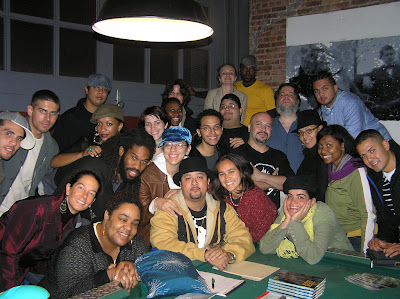 Poets and Friends of the louderARTS Project and Acentos gather in the Bronx for a reading by Martín Espada, October 2005
Poets and Friends of the louderARTS Project and Acentos gather in the Bronx for a reading by Martín Espada, October 2005
xxxxxxxxxxxxxxxxxxxxxxxxxxxxx
More News on Book of Mornings
Raul Niño: Reading and Booksigning Thur. July 26, 2007@ 7 p.m.
Tianguis
2003 S. Damen
Chicago, IL 60608
Located across the
CTA Pink Line, Damen stop.
ph: 312.492.8350
Lisa Alvarado
 onight I walked home from the 24th and Mission BART stop. It was Valentine’s day, and the neighborhood celebrated by being outside.
onight I walked home from the 24th and Mission BART stop. It was Valentine’s day, and the neighborhood celebrated by being outside.


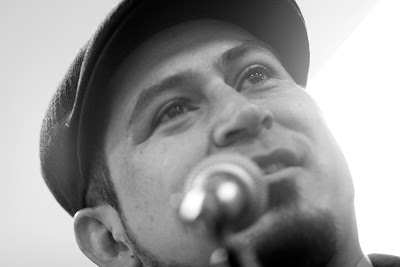
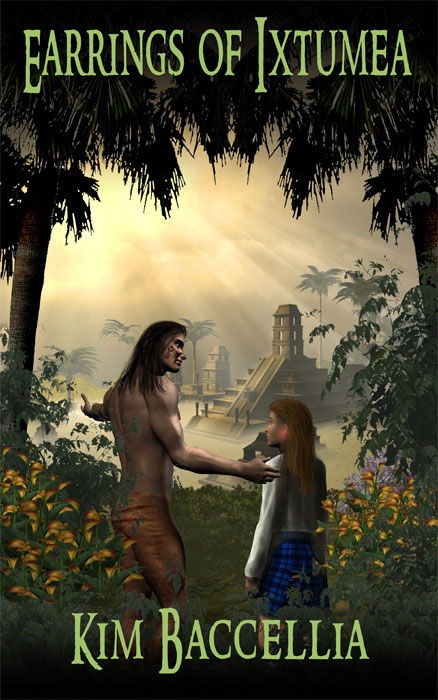

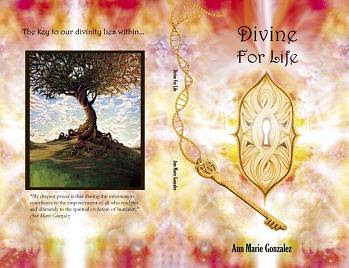


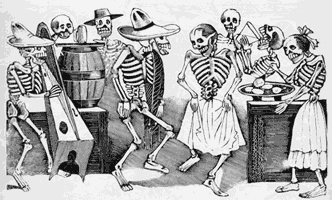
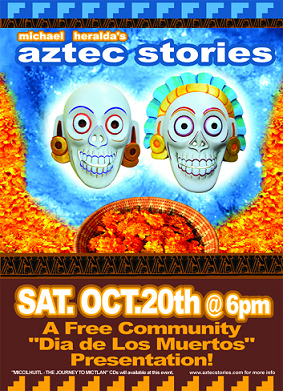
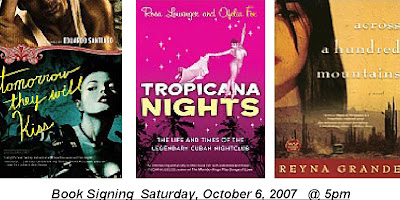






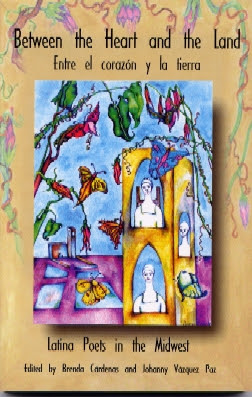
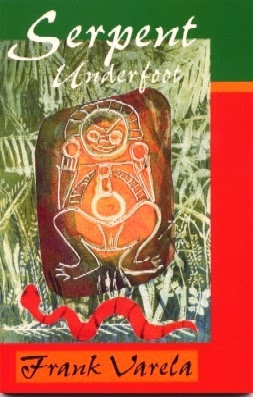
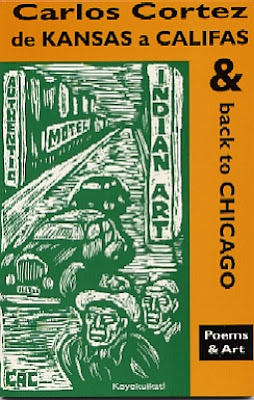
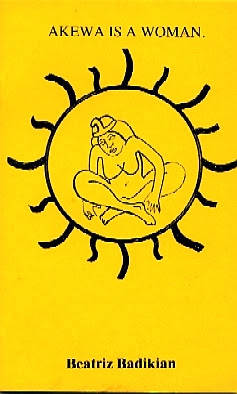
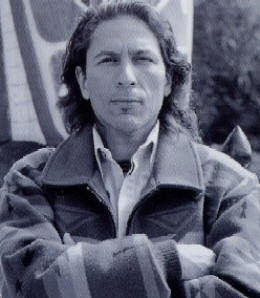

Lisa, what a wonderful roundup! Mil gracias.
Yes, your post makes me wish I could be there.
RudyG
Daniel, RudyG and all you other lovely Blogueros---
I'd love to give you a tour of Chicago any time! : )
Lisa